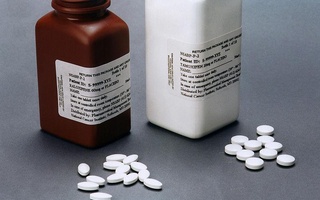A group of Harvard global health activists staged a protest Friday in front of Merck’s laboratory near the Harvard Medical School to urge the drug company to provide discounted HIV and AIDS medicine to poor countries.
The protest was billed as a “pool party demonstration”—replete with beach balls, an inflatable pool, and students in swim trunks—to demand that Merck “jump into the pool,” a reference to the Medicine Patent Pool.
The Medicine Patent Pool is an organization that negotiates deals with drug companies to ensure the availability in low-income and middle-income countries of discounted medicine to fight the human immunodeficiency virus. In many of these countries, drugs to fight the disease are far too expensive to be affordable to ordinary individuals. The deals struck by the Medicine Patent Pool seek to reduce costs while also attempting to ensure that the companies are minimally impacted by the discounts.
Merck Research Laboratories develops drugs to help treat HIV, but has not joined the patent pool. Merck does provide discounts for low-income countries but has not extended them to middle-income countries, which was a focus of Friday’s protest. The protest was organized by the Harvard College Global Health and AIDS Coalition and Students for Global Health and Justice at the Harvard Medical School.
According to Alyssa T. Yamamoto ’12, a member of the Harvard College group, demonstrators are demanding that Merck “join the pool by January 2012 or at the least implement a similar program” by that deadline.
Yamamoto said that the pool party was inspired by similar protests against Johnson & Johnson in the United Kingdom, led by the Stop AIDS Campaign.
At Friday’s protests, the student speakers at the event addressed the audience while standing in the inflatable pool, criticizing Merck’s refusal to join the pool as a human rights violation.
Gilead, a competitor to Merck, has already signed an agreement with the Pool, according to Matthew F. Basilico ’08, a second year student at Harvard Medical School. At least four other peer companies are in negotiations to join the pool.
Basilico noted that a further goal of the demonstration was to have Merck create an “agreement with the pool to include pro-access provisions, for middle-income countries and active pharmaceutical ingredients,” referring to the need to make the drugs not just affordable but also easily available.
Nworah B. Ayogu ’10, a second year medical student and president of the Medical School’s Student Council, noted afterwards that the demonstrators were content with how the event went. He said that he hoped that Merck would now “realize how seriously Harvard takes its commitment to the underserved and the Medical school takes its mission to alleviate human suffering caused by disease.”
Read more in News
Suspect Arrested After Attempted Bank RobberyRecommended Articles
-
No HeadlineEYE GLASSES adjusted to any face firmly and neatly, so that they will not vibrate or drop off during any
-
 MIT Behind Harvard in Access to Medicines
MIT Behind Harvard in Access to Medicines -
America Un-InventsWhile the patent system is failing in many areas, the America Invents Act (AIA), despite Obama’s glowing praise, does little to fix the most pertinent issues currently facing our country's process of protecting and tracking intellectual property.
-
Say Yes to (AIDS) Drugs: Prioritizing Lives Over ProfitWe must be willing and able to provide innovative mechanisms like the Medicines Patent Pool that persuade corporate actors to become actual do-gooders in society, however slowly
-
AIDS Activists Call For Merck to Join Patent PoolThe “pool party,” which coincided with World AIDS Day, urged Merck to join the program that is designed to reduce the costs of AIDS drugs in developing countries.
-
AIDS Coalition Protests Merck LaboratoriesThe Harvard College Global Health and AIDS Coalition put a Valentine’s Day spin on the group’s campaign demanding that pharmaceutical company Merck’s increase access to its AIDS drug raltegravir in poor nations.













